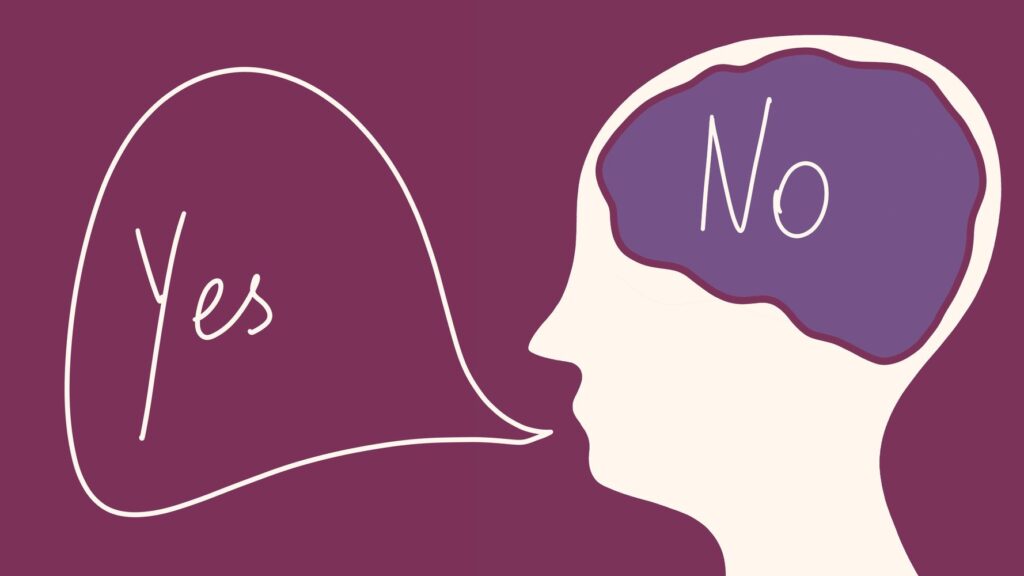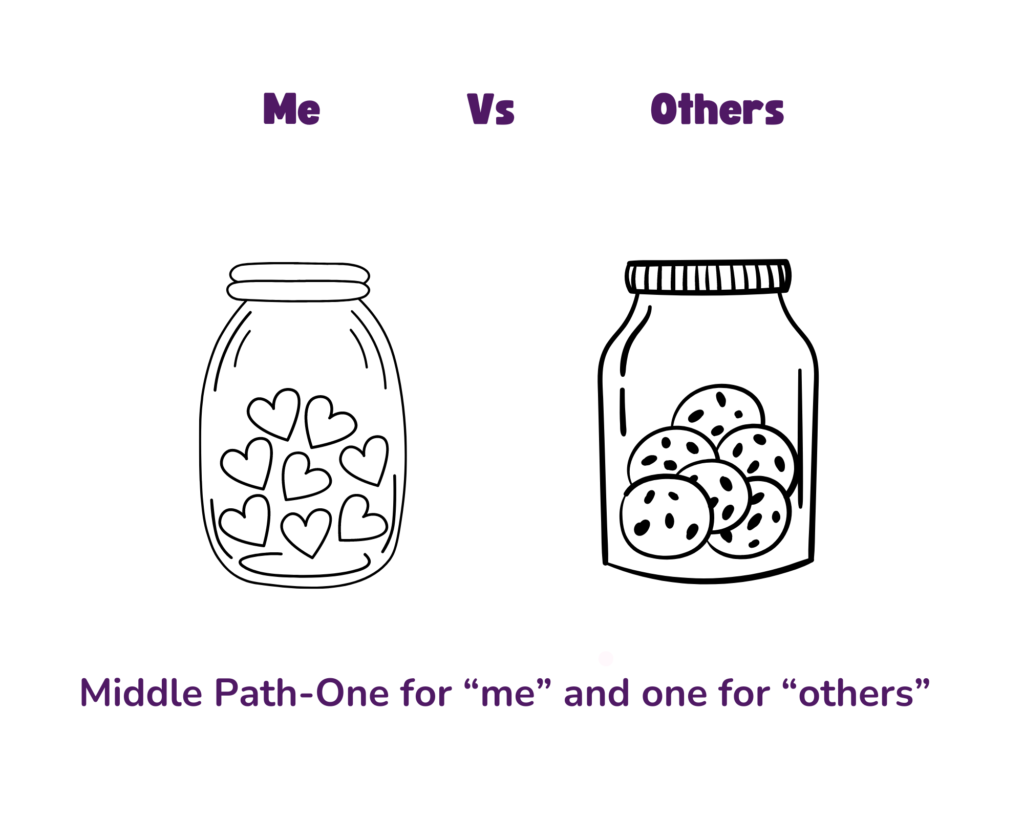The psychology of people pleasing
The psychology of people pleasing

X: “This is killing me. I am going to say No next time. I am just not able to do it and cannot afford this kind of involvement anyways! I need to have time for myself.”
Next day-
Y: “Hey! I need help with so and so. Will you be coming?”
X:”Yes” (followed by many reactive thoughts)
Why do we talk about people pleasing and how does it impact our daily lives? People pleasing means not being able to say “No” to others or not being able to communicate or share one’s true feelings due to multiple reasons like a weak sense of self, low self esteem, narcissism, fear of rejection, anxiety, too much concern or emotional empathy for others. This behavior can also be due to an exaggerated focus on good conduct, stoicism, extreme idealism or altruism, a heightened sense of responsibility towards others, half learnt spiritual wisdom of selflessness as well. One thing is for sure- people pleasing if taken to an extreme can make one feel exhausted, dissatisfied and helpless due to a constant a focus on “others”. This can also affect those who are being pleased because the pleaser is not always contributing willingly, thereby hiding his or her real feelings and creating a pretense that keeps others in the dark. For example, a boss may stay away from sharing the negatives of his or her employee in a performance review because he likes to please people, however may end up declining the promotion a few months later. Thus, instead of being open and honest in communication, the person might hesitate in telling the truth at the right time, thus causing harm to others.
If one is happy serving others and has the capacity to do it, there is nothing wrong with it. But going beyond our capability or resources can create some hurdles. These might be areas of learning for us.
What is the psychology of people pleasing?
Not having a strong “self” view
I like to please people and know the psychology of this well. I also know how this creates inner conflicts in my life but brings a sense of contentment too. I do want to defend myself by saying that in my case people pleasing comes from genuine intentions of wanting others to be happy and being very interested in contributing to that in some way. I am able to say “No” often enough though but I think that is also a reaction coming from inside to the enormous times I have said Yes unwantedly. The decision to say “No” is hard because I am sometimes unable to distinguish between what is more important- me or others. The lack of clear distinction between “I” and “others” also originates in the spiritual foundations and altruistic belief that all beings are equal and deserve happiness equally. Hence how to choose between when to help myself vs when to help others is not always easy. I truly believe that by helping others we help ourselves too. And it is only the “story” we tell ourselves around it, that causes pain or suffering. However I agree that the wisdom is incomplete – somewhere I have learnt the lesson of altruism to an extreme or incorrectly and I am trying to apply it with this half knowledge.
Sharing a bit on the lesson of non-self here. The whole philosophy of mindfulness (Vipassana) rests on the core foundational principle that there is no “individual self” in the universe. This is known as Anatta in Pali. Anatta (nothingness) is not as “other worldly” or “supernatural” or “spiritual” as you may think. It is simple physics and can be observed and validated as a theory with some basic practice as well. By practising Vipassana meditation it becomes clear that thoughts are just thoughts and feelings are just feelings, and this whole mind body phenomenon is not any “I”. However, since the the knowledge is not complete, some sense of ego comes up every now and then, telling us the story that “I” is important and creates our misery.
What I am trying to say here is that not all “people pleasing” comes from wrong views or low self esteem or anxiety etc. It can also come from wisdom. However and alas, our wisdom is not complete and hence, we suffer. So, taking the middle path is important. Whatever keeps our mental stories happy.

Remember that true selflessness is not an easy fiat. One cannot act selfless if one is selfish. If we commit this mistake, we harm ourselves as well as others.
Selflessness does not mean “others” are important and “we” are not. Selflessness means that the idea of a self aka the concept of an individual “I” separate from others- is an illusion.
Falling for the stories of thoughts and feelings keeps us trapped in a sensory universe that we call “I”. We can only free ourselves from that suffering if we try to develop in this awareness. This can only come from practice. Otherwise it is like trying to play High jump in Olympics without even knowing how to jump. We must accept that we are incapable of selflessness and that the capability for that needs to be developed. And so we must act accordingly cultivating the quality slowly, developing the intention.
Idealism, tradition and regard for others

Sometimes pleasing others can come from a sense of heightened idealism and regard for others. We may have grown up in an environment which taught us to be idealistic as well as responsible towards others. In countries like India or Asia, we often live in joint families and are taught from our childhood traditionally that we must care about others, we should learn to see the divine in others or we should practice good conduct, guest is God, we must respect elders etc. This is surely a spiritual lesson in selflessness and respect and you can see it in all Asian cultures. We can also see the origin of this in eastern religions which clearly state that good conduct is imperative and harming others is ill karma and must be avoided at all costs. However, again, often we end up learning the lessons incorrectly and stretch them to an extreme. Also, often without understanding where they come from. This leads to an imbalanced view of ignoring oneself and focusing on others which eventually stresses us out. As mentioned above, selflessness does not mean ignoring oneself and making others important. It means developing a pure mind which does not focus on the idea of a “self” because it is truly an illusion. We have to put in the effort to developing that understanding before we apply the lesson that comes with it. In all mindfulness practices, our first duty is to work on ourselves.
Fear of rejection, “fitting in”, wanting to be “liked”

Many times people end up pleasing others because of a fear of rejection by others. As in we are worried that if someone asked us for help and we refuse, they would be angry with us and not accept us anymore. This is especially true when we are part of communities and the rejection can happen at a community level. This fear is quite common and is one of the most common reasons we end up saying “Yes” to things we may not personally agree with or have time for. This can sometimes happen at a bigger cost. For example, one has moved to a big city for a job and it is common in the company culture to drink. When you go out on office outings you feel hesitant in saying “No” to drinks because you think that might affect your connections with others. You know you would be more popular if you drank vs if you did not. And everyone wants to be “liked”. This could be especially important if you are in sales and have to go out for frequent meetings with clients. In such a situation, you might end up putting your health at stake just to please others. The need to feel belonging with others is human but one must be careful about what one is undertaking just to please others. These days it is common for people to immigrate to foreign countries due to better career opportunities as well and the culture of “fitting in” has creeped into a lot of things.
Even though above may be true to a large extent, the main thing is that we are simply not able to tolerate the anxiety around rejection. So often, we say “Yes” even before others reject us. We are too afraid to say “No”. This is when pleasing others becomes like a disorder. We avoid any possibility of rejection by agreeing to participate irrespective of what our inner voice is saying.
Belief that others may not be able to “handle” suffering
Sometimes people may commit the error of thinking that it is necessary to help others because they would not be able to do it on their own. So they avoid saying no to helping them. This can be really a difficult choice. For example there may be someone who might be into substance abuse or not able to keep a stable job or going through a mental challenge. Should you help them even if you have your own needs that are not getting addressed or should you protect yourself and let them slide letting them learn a lesson or two about life? I personally find it difficult to practice tough love. I think favorable circumstances are necessary to help people be their best. Seeing others suffer is difficult for all.
Low self esteem
As mentioned previously about “fitting in”, one’s fear about rejection from others may actually be stemming from having low self esteem. It simply means one does not value what is within oneself enough due to which one says “yes” to outside. If one has developed strong self awareness and strong values, one may be able to see the importance of their own wisdom or insight and not be too willing to please or agree with others. We say yes to others easily because something is not working well inside us.
Using mindfulness to understand patterns- how to stop pleasing others
1. Self awareness of pleasing patterns– Like in every other case, a mindfulness practice always starts with self awareness. One has to step back and start observing (our thoughts) that we have a mental pattern that is hurting us. Whenever we say “Yes” to helping others or take care of others or focus on others, if there is a reaction inside that says “No” or “I don’t want to do this”, then we need to start taking it seriously. It means we are doing more than we can really commit and there is something inside us needing attention. One can find a friend to discuss this or if possible a good therapist.
2. Gauging the intensity of the problem– Just like in pain, we first acknowledge the pain but then try to understand how deep or sharp the pain is, we can also reflect on the quality of the problem we are facing. How strong is our emotion regarding our not willing to help others? Do we feel a vehement “No” from inside, when we say “Yes”? Are we feeling too tired and exhausted by serving others’ goals and intentions? This is more common than we think. It in fact happens to most people in different stages in life. Either at our job, or within our families (in Asia we have joint families or at least we interact with relatives at all times), people often feel split between the responsibilities to others vs the responsibilities to oneself. Sometimes the responsibilities are important and cannot be shirked- like someone gets ill and you have to pitch in to take care or someone resigns and you have to step up at your job to fill in for the role etc. However, there are many times when we are just unnecessarily forced to cater to others. Job dissatisfaction is so common – people who never want to do management are poured management tasks, those who want to do engineering have to spend all their time in research, those who wish to innovate are busy with testing, etc. For a long time we are running the agendas of “others” and not finding the time, luck or opportunity to do what we really want to do. In healthcare also healthcare providers often complain of burnout- their jobs are very people focused and moreover, exposed to the suffering of others on a daily basis. So, at some point a person does feel that they are not living their own life anymore and something needs to change.
3. Drawing clear boundaries for oneself– Sometimes when helping others or saying “Yes” to others becomes a pattern, others may start taking you for granted. It may look like that they have stopped respecting your boundaries. But remember, what has truly happened here is that you have stopped respecting your boundaries yourself by letting them in. In reality boundary is a “real” thing that exists. It is not a fictitious thing or a concept. The weakening of boundaries happens far before a habit pattern like pleasing others develops. In times of adversity, our mind gets clouded with anxious thoughts and feelings and hence, we are unable to find the focus or the strength within ourselves to accomplish things. So we start looking outside for help. In that process, we open our boundaries for outside vibrations to come in. Once outside vibrations start interacting with us, we lose control of our senses and start reacting to those vibrations as a habit. Hence, we are unable to respond from a space of stillness or inner strength. We simply react to the needs of the outside world and outside forces are able to exert a pull on us which we are unable to resist. This is how we slowly start losing the grounding of ourselves and become slaves to others’ agendas. So people pleasing starts only as a result of lack of vigilance of our boundaries. This does not mean one cannot ask for help. But one must keep making the effort to gain back the lost awareness of the mind. Awareness of thoughts and feelings keeps giving us the knowledge and insight we need to live in the world. It helps us remain self reliant and independent. If one starts becoming dependent on others to give us satisfaction then we will end up serving them, not ourselves.
4. Having the courage to be ourselves– To keep ourselves aligned to our inner truths we must have regular practices to give us the strength and momentum. Just like to play Tennis we have to practice Tennis, similarly to be self reliant and self focused, we have to practice that. If there is too much momentum already developed in the opposite direction- aka outside forces are dominating us, then we have to start developing the inner forces. For that self awareness, spending time with ourselves, getting help through a friend or a therapist, doing activities that strengthen us- all this is needed. In the workplace, we should not hesitate to take the help of a colleague or even boss if they are understanding. For example, if you are too afraid to give your opinion or try to understand others too much, you can share this with someone and get some support. It is important that we speak our truth and are aligned to ourselves. Remember that most of the times we are simply uncomfortable and afraid. And that is the only thing that stops us. Others are not really responsible for our problems. We are. So there isn’t much value in generating too much stress, anxiety, fear, anger or other emotional stories around “others”. We are reacting because we have stopped looking inside long ago.
The true mindful way to help others selflessly
1. Nonjudgmental awareness of thoughts- Sit down in a comfortable pose. Start observing your incoming and outgoing breath. As thoughts arise, let them simply pass. Do not engage with them or let them agitate you. Do not follow them. Just simply observe them for what they are- just thoughts- a string of vibrations. As your attention moves away from your breath, gently bring it back to it, again without generating any reaction. This practice is called Anapana meditation, a concentration practice that was originally taught by the Buddha and is currently taught as part of all Vipassana courses. The main point of this practice is to bring the mind to the present which is possible with the help of the breath object which is always available and present. If one follows thoughts, engages or believes in their stories, one keeps generating more thoughts in response and hence, never can get out of them. Thoughts are sensory and the first thought can act as a stimulus to the next thought and so on. And hence to really calm the mind, it is most important to move away from thoughts and focus our attention on breath. To really learn this practice well, it is advisable to learn in a Vipassana course under the supervision of an accomplished teacher only. But I have shared this just to share some insights around how our mind really works and what mindfulness is truly all about. Mindfulness is basically a practice of helping mind pay attention to the present moment while observing the universal realities within our mind body system. Hence concentration is always the first step of mindfulness. It calms down the mind and helps improve concentration or focus so we can truly understand what is going on inside us. A disturbed mind or a mind full of thoughts can never achieve this.
2. Nonjudgmental awareness of feelings– When the mind calms down the next step is to observe the feelings in one’s body with the same calmness, nonjudgmental awareness and equanimity. By seeing feelings that have an intensity like anger, hatred, fear, craving etc with a calm mind, one is able to detach from them as well. This practice is the practice of Vipassana meditation. By developing nonjudgmental awareness of our thoughts and feelings, we do not let them grow strong in us and we are able to tap into our mind and it’s intentions in a calm and grounded way. With such a calm mind, one is able to truly see things as they are and the intense thoughts and feelings that were seemingly looking important, do not look so threatening any more.
3. Developing a true selfless mind– Only a non attached mind free from the clutches of intense thoughts and feelings can truly develop a view free from ego. Such a mind is free and happy and can genuinely attend to others with the pure intention to help. Having such a mind we do not feel tormented and distressed because the “ego” view is gone. This is true selflessness and a mind rightfully equipped to help others. This comes with a lot of practice (years, even lifetimes).
4. Staying in the middle, away from the extremes of pleasing others or narcissism- Until we attain this, we must respect our limitations and work towards developing such a mind while keeping our energies and boundaries well protected. By tormenting or sacrificing ourselves, we are only increasing our reactions and judgment, which will in turn make us more miserable and egotistical. Pleasing others to an extreme can even lead to narcissism sometimes because there is a moment beyond which one is unable to tolerate the stress and exhaustion of serving others’ agendas and our mind eventually decides to react with ego. Both “pleasing others” and “narcissism” are thus extremes and only choices we make in ignorance. The best path is in the middle- developing our inner awareness, insight and capability.

Archana Bahuguna
Search
Categories
- Anxiety (1)
- Beliefs (1)
- Breath observation (1)
- Change (1)
- Compassion (1)
- Concentration (6)
- Disease (1)
- Disorder (1)
- Emotions (8)
- Empathy (1)
- Exam anxiety (1)
- Feelings (4)
- Happiness (1)
- Learning (1)
- Limitations (1)
- Logic (1)
- Meditation (5)
- Mental disorders (4)
- Mindfulness (10)
- Narcissism (1)
- OCD (1)
- Pleasing others (1)
- Psychiatry (1)
- Python tools (1)
- Resilience (2)
- School (1)
- Self view (1)
- Social support (1)
- Speed (1)
- Student (2)
- Students (1)
- Teens (1)
- telehealth (1)
- therapy (1)
- Thoughts (6)
- Vipassana (3)
Latest Posts




